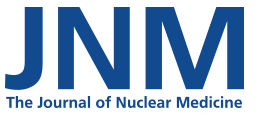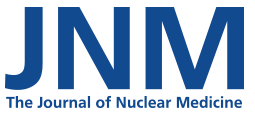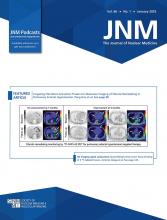Abstract
Purpose: The 68Ga-PSMA PET/CT is a commonly used imaging modality in prostate cancers. However, few studies have compared the diagnostic efficiency between 68Ga-PSMA and 18F-FDG PET/CT and evaluated whether a heterogeneous metabolic phenotype (especially PSMA-FDG+ lesions) exists in patients with castration-resistant prostate cancer (CRPC). We determined the added value of 18F-FDG PET/CT compared to 68Ga-PSMA PET/CT in CRPC patients and identified CRPC patients who may benefit from additional 18F-FDG PET/CT. Methods: Data of 56 patients with CRPC who underwent both 68Ga-PSMA and 18F-FDG PET/CT from May 2018 to February 2021 were retrospectively analysed. Patients were classified into two groups with or without PSMA-FDG+ lesions. The differences in patient characteristics between the two groups and predictors of patients who having at least one PSMA-FDG+ lesion were analysed. Results: Although both the detection rate (75.0% vs. 51.8%, P = 0.004) and positive lesion number (135 vs. 95) of 68Ga-PSMA PET/CT were higher than 18F-FDG PET/CT, there were still 13/56 (23.2%) patients with at least one PSMA-FDG+ lesion. The prostate-specific antigen (PSA) and Gleason score were both higher in the patients with PSMA-FDG+ lesions than in those without PSMA-FDG+ lesions (P = 0.04 and P<0.001, respectively). Multivariate regression analysis showed that the Gleason score (≥8) and PSA (≥7.9 ng/mL) were associated with the detection rate of patients who had PSMA-FDG+ lesions (P = 0.01 and P = 0.04, respectively). The incidences of having PSMA-FDG+ lesions in low-probability (Gleason score<8 and PSA<7.9 ng/mL), medium-probability (Gleason score≥8 and PSA<7.9 ng/mL or Gleason score<8 and PSA≥7.9 ng/mL), and high-probability (Gleason score≥8 and PSA≥7.9 ng/mL) groups were 0%, 21.7%, and 61.5%, respectively (P<0.001). Conclusion: Gleason score and PSA are significant predictors for PSMA-FDG+ lesions, and CRPC patients with high Gleason score and PSA may benefit from additional 18F-FDG PET/CT.
- Copyright © 2021 by the Society of Nuclear Medicine and Molecular Imaging, Inc.







